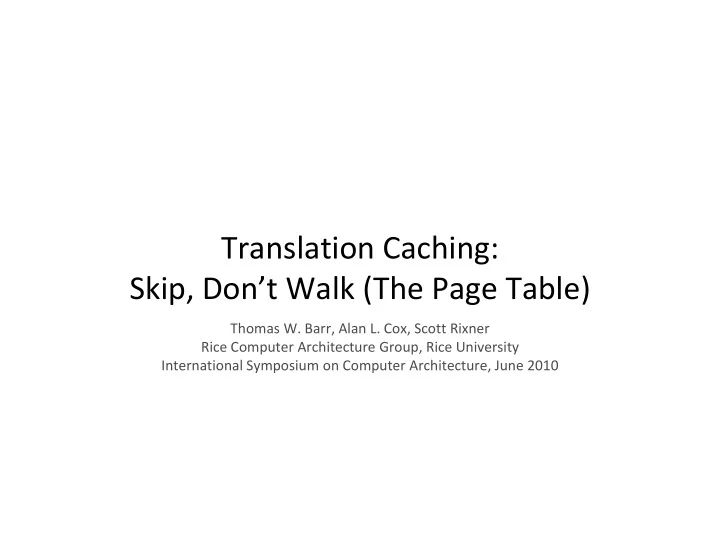

Translation Caching: Skip, Don’t Walk (The Page Table) Thomas W. Barr, Alan L. Cox, Scott Rixner Rice Computer Architecture Group, Rice University International Symposium on Computer Architecture, June 2010
Virtual Memory: An increasing challenge - Virtual memory - Performance overhead 5-14% for “typical” applications. [Bhargava08] - 89% under virtualization! [Bhargava08] - Overhead comes primarily from referencing the in-memory page table - MMU Cache - Dedicated cache to speed access to parts of page table rice computer architecture group - 2
Overview - Background - Why is address translation slow? - How MMU Caching can help - Design and comparison of MMU Caches - Systematic exploration of design space - Previous designs - New, superior point in space - Novel replacement scheme - Revisiting previous work - Comparison to Inverted Page Table rice computer architecture group - 3
Why is Address Translation Slow? - Four-level Page Table 0x5c8315cc1016 rice computer architecture group - 4
MMU Caching - Upper levels of page table correspond to large regions of virtual memory - Should be easily cached - MMU does not have access to L1 cache - MMU Cache: Caches upper level entries (L4, L3, L2) rice computer architecture group - 5
MMU Caching - In production - AMD and Intel tagging - Design space - Tagging organization UPTC UTC - Page table/Translation - Organization - Split/Unified - Previous designs not optimal SPTC STC - Unified translation cache (with modified replacement scheme) outperforms existing devices rice computer architecture group - 6
Page table caches - {0b9, 00c, 0ae, 0c1, 016} Simple design - PTE address pointer Data cache - 0x23410 0xabcde Entries tagged by physical address of page table entry 0x55320 0x23144 - Page walk unchanged 0x23144 0x55320 - Replace memory accesses with ... ... MMU cache accesses ... ... - Three accesses/walk ... ... rice computer architecture group - 7
Translation caches {0b9, 00c, 0ae, 0c1, 016} - Alternate tag (L4, L3, L2 indices) pointer - Tag by virtual address (0b9, 00c, 0ae) 0xabcde fragment (0b9, 00c, xxx) 0x23410 - Smaller (0b9, xxx, xxx) 0x55320 - 27 bits vs. 49 bits ... ... - Skip parts of page walk ... ... - Skip to bottom of tree ... ... rice computer architecture group - 8
Cache tagging comparison SPEC CPU2006 Floating Point Suite rice computer architecture group - 9
Split vs. Unified Caches - Hash joins - Reads to many gigabyte table nearly completely random - Vital to overall DMBS performance [Aliamaki99] - Simulate with synthetic trace generator - MMU cache performance - 16 gigabyte hash table - 1 L4 entry - 16 L3 entries - 8,192 L2 entries - Low L2 hit rate leads to “level conflict” in unified caches - Solve by splitting caches or using a smarter replacement scheme rice computer architecture group - 10
Split vs. Unified Caches rice computer architecture group - 11
Level Conflict in Unified Caches - LRU replacement - Important for high-locality applications - Avoid replacing upper level entries - After every L3 access, must be one L2 access - Each L3 entry pollutes the cache with at least one unique L2 entry rice computer architecture group - 12
Split vs. Unified Caches - Split caches Type Type Type - Split caches have one cache per L4 L3 L2 level L3 L2 - Protects entries from upper levels - Intel's Paging Structure Cache rice computer architecture group - 13
Split vs. Unified Caches - Problem: Size allocation - Each level large? Type Type Type - Die area L4 L3 L2 - Each level small? L3 L2 - Hurts performance for all applications - Unequal distribution? - Hurts performance for particular applications rice computer architecture group - 14
Variable insertion point LRU replacement - Modified LRU - Preserve entries with low reuse Entry Type for less time - Insert them below the MRU slot L2 - VI-LRU L3 - Novel scheme L4 - Vary insertion point based on L2 content of cache L3 - If L3 entries have high reuse, give L2 entries less time rice computer architecture group - 15
Variable insertion point LRU replacement rice computer architecture group - 16
Page Table Formats - In the past, radix table implementations required four memory references per TLB miss - Many proposed data structure solutions to replace format - Reduces memory references/miss - This situation has changed - MMU cache is a hardware solution - Also reduces memory references - Revisit previous work - Competing formats are not as attractive now rice computer architecture group - 17
Inverted page table - Inverted (hashed) page table - Flat table, regardless of key (virtual address) size - Best case lookup is one - Average increases as hash collisions occur - 1.2 accesses / lookup for half full table [Knuth98] - Radix vs. inverted page table - IPT poorly exploits spatial locality in processor data cache - Increases DRAM accesses/walk by 400% for SPEC in simulation rice computer architecture group - 18
Inverted page table rice computer architecture group - 19
Inverted page table - IPT compared to cached radix table - Number of memory accesses similar ( ≈ 1.2) - Number of DRAM accesses increased 4x - SPARC TSB, Clustered Page Table, etc. - Similar results - Caching makes performance proportional to size - Translations / L2 cache - Consecutive translations / cache line - New hardware changes old “truths” - Replace complex data structures with simple hardware rice computer architecture group - 20
Conclusions - Address translation will continue to be a problem - Up to 89% performance overhead - First design space taxonomy and evaluation of MMU caches - Two-dimension space - Translation/Page Table Cache - Split/Unified Cache - 4.0 → 1.13 L2 accesses/TLB miss for current design - Existing designs are not ideal - Tagging - Translation caches can skip levels, use smaller tags - Partitioning - Novel VI-LRU allows partitioning to adapt to workload rice computer architecture group - 21
Recommend
More recommend